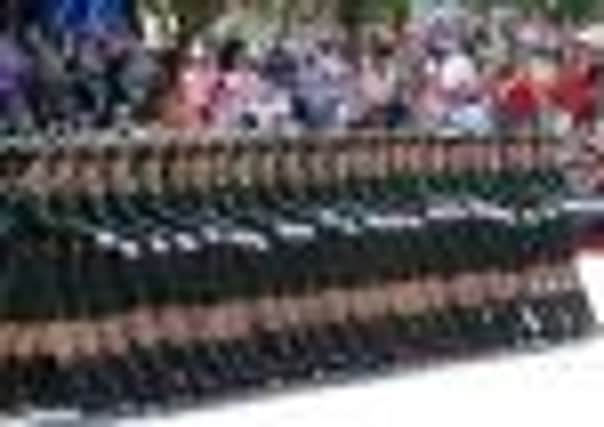China set to up spending on military by 11 per cent


The increase, announced by parliament spokesman Li Zhaoxing, will bring official outlays on the People’s Liberation Army to 670.3 billion yuan (£69bn) for 2012.
Beijing’s public budget is widely thought by foreign experts to undercount its real spending on military modernisation. China also does not include expenditure on its nuclear weapons programme in the budget.
Advertisement
Hide AdAdvertisement
Hide AdLi said the world has nothing to fear, and the money spent on the PLA paled in comparison with the Pentagon’s outlays.
“You can see that we have 1.3 billion people with a large land areas and a long coastline, but our outlays on defence are quite low compared to other major countries,” Li told a news conference before the annual full session today of the National People’s Congress, the Communist Party-controlled legislature that will approve the budget.
“China’s limited military power is for the sake of preserving national sovereignty, security, and territorial integrity,” said Li, a former foreign minister.
Asian neighbours, however, have been nervous about Beijing’s expanding military, and this latest double-digit rise could reinforce disquiet in Japan, India, Southeast Asia and self-ruled Taiwan, which China considers part of its territory.
Mr Obama has sought to reassure Asian allies that the US will stay a key player in the area, and the Pentagon has said it will “rebalance toward the Asia-Pacific region” at the expense of Europe.
“Eleven per cent, for a Chinese defence budget, is what I would characterise as a reasonably sizeable increase,” said C Uday Bhaskar, a former director of India’s Institute for Defence Studies and Analyses in New Delhi.
Mr Obama’s proposed budget for the fiscal year of 2013 calls for a Pentagon base budget of $525.4bn, about $5.1bn less than approved for 2012.
Beijing has sought to balance long-standing wariness about US intentions with steady relations with Washington, especially as both governments focus on domestic politics this year, when the president faces a re-election fight and China’s ruling Communist Party undergoes a leadership handover.
Advertisement
Hide AdAdvertisement
Hide AdBut the US “pivot” has fanned unease in China, with some PLA officers calling it an effort to fence in their country and frustrate Beijing’s territorial claims.
China has advertised its long-term military ambitions with shows of new hardware, including its first test flight of a stealth fighter jet in early 2011 and its launch of a fledgling aircraft carrier in August – both trials of technologies that remain years from deployment.
Beijing is also building new submarines, surface ships and anti-ship ballistic missiles as part of its naval modernisation.